ADSactly Literature: Benchmark Theater - The Iceman Cometh

Hello dear theater lovers,
It seems like ages ago when I wrote the second post in this series, which dealt with Eugene O’Neill’s ‘Mourning Becomes Electra’. In truth, it wasn’t quite so long ago, but in the meantime, we’ve talked about a whole lot of other great playwrights and I feel it is time we come back to O’Neill.
Today, I would like to talk about the play that introduced me to O’Neill, The Iceman Cometh.
Now, before we go any further, let me make a confession – for the longest time, I thought it was actually ‘The Iceman Comet’, which I thought was rather a cool name for a play and figured I’d read it. And then I learned the real title, read the play and thought it was even cooler than I first expected.
Right, let’s begin with a brief synopsis. ‘The Iceman Cometh’ is a play in four acts, which takes place exclusively in Harry Hope’s No-Chance Saloon (appropriately named character and bar, as you’ll soon see).
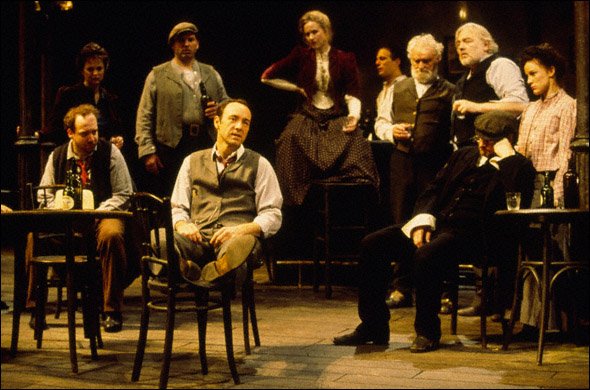
Production with the legendary Kevin Spacey source
The characters there are stuck in a permanent sort of slumber, both literally and more importantly, figuratively. Each of them nurtures some sort of pipe dream. For example, the owner, Harry Hope hasn’t set foot in the outside world in twenty years, yet is confident that tomorrow will be the day he finally goes out.
The lie of a pipe dream is what gives life to the whole misbegotten mad lot of us, drunk or sober.
There’s another character who has a pipe dream of re-opening a casino which he’ll never do. The English “Captain” and the South African “General”, enemies-turned-best-friends insist they’ll soon return to their homes, but they don’t. And so on, the bar is full of dreamers.
Their life, however, is disrupted first by the arrival of Parritt, a young anarchist who seems to have escaped arrest (we later learn he actually betrayed his fellow anarchists, including his mother) and has come to as the help of one of the men at the bar, Larry, an ex-anarchist himself.
Their slumber is furthermore disturbed by the arrival of their old friend, Hickey, an ex-pipe dreamer himself. But Hickey is sober now – he has quit both the booze and the pipe dreams. We learn that Hickey’s wife is dead, though not in what circumstances. Throughout the play, Hickey pesters the others to get up and actually do what they want, to stop dreaming and actually take action. He forces Harry Hope to go out, for him to return a minute later claiming he was almost run over by a car and will have better luck tomorrow.
Slowly, the characters grow to hate Hickey – they’ve gone out and tried to achieve their pipe dreams and failed. Hickey has opened their eyes to their own pathetic realities, and now, they want him to go.
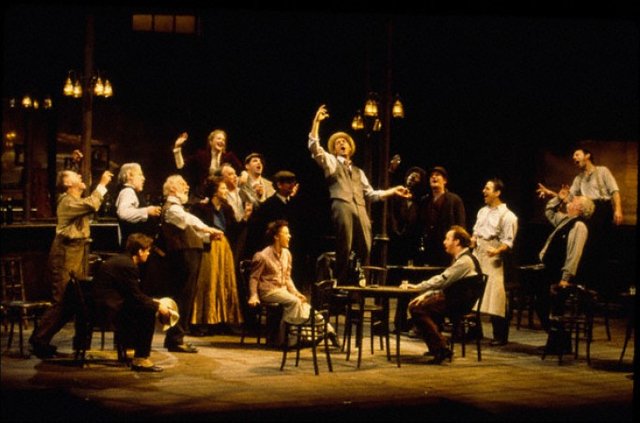
Which he does. Two policemen arrive, called by Hickey himself, who has decided to turn himself in. He tells the others it was him who killed his wife (there’s a running joke about her going off with the iceman, hence the title) out of love. Hickey, we learn, was constantly drinking and cheating on his wife, Evelyn, and she always forgave him, dreaming that one day, he would change his ways. Knowing full well that day would never come, Hickey decides to free her from her pipe dream.
"well, you know what you can do with that pipe dream now, don't you?"
But upon confessing this, he realizes his mistake, his insanity, and that people need pipe dreams to survive. The others agree to testify to his insanity, despite Hickey begging them not to, claiming he wants the death penalty, having lost all his illusions about life.
With Hickey taken away by the police, the characters return to their initial dreaming state. Now, they can continue nurturing their pipe dreams, without anyone bothering them about the unpleasant truth. All except one, that is. Young Parritt, moved by Hickey’s words, is forced to confess he betrayed his mother not out of patriotism, but out of hatred for her. He goes off and jumps off the fire-escape, showing once more the futility of life without pipe dreams.
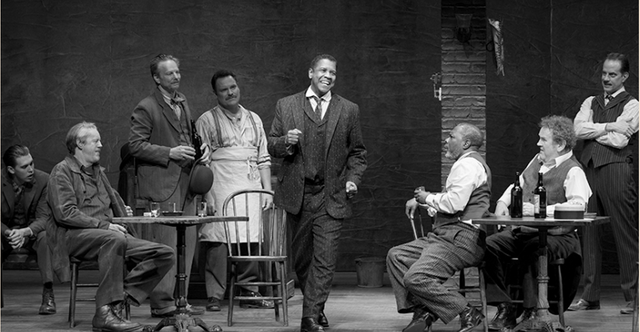
More recnt production starring Denzel Washington source
Obviously, the main theme of ‘The Iceman Cometh’ is the pipe dream itself and the somewhat elusive truth – everyone has and needs a pipe dream in order to survive. Including Hickey, who arrives as some sort of savior for the bunch. One of the characters even likens him to the Antichrist, bringing about a monumental shift in their existence. And through most of the play, that is Hickey’s attitude – that he has finally learned the truth and can now enlighten (and save) his fellow dreamers.
I know you become such a coward that you'll grab at any lousy excuse to get out of killing your pipe dreams. And yet, as I've told you over and over, it's exactly those damned tomorrow dreams which keep you from making peace with yourself. So you've got to kill them like I did.
But Hickey’s still dreaming himself, as we learn in his surrendering speech. Throughout the play, Hickey and Parritt serve as double for the other. And both criminals are driven to their acts not by love, as they claim even to themselves, but by hate.
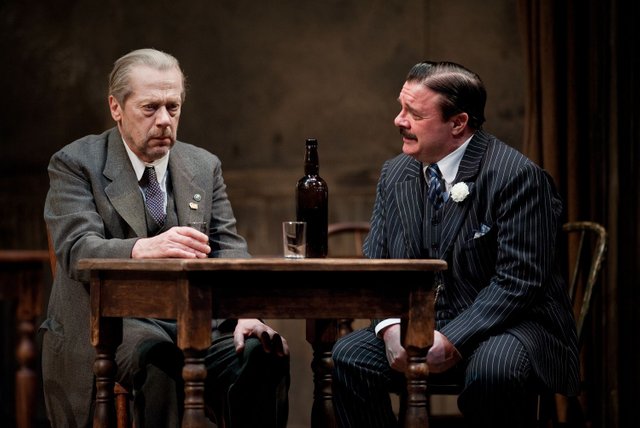
Nathan Lane as Hickey in 2012 production source
Hickey, convinced he freed his wife from an impossible pipe dream, can live with killing her. But when he finally understands that’s a lie and that he actually killed her because he hated her and the guilt she made him feel, he begs for death (as does Parritt, ultimately).
So, Hickey only preaches the ‘killing of tomorrow’, the destruction of the pipe dream, while in fact nurturing his own.
This is particularly interesting because it draws upon another key subject of the play – self-awareness. Because it’s impossible to be aware of your pipe dream, isn’t it? Or at least, really hard. In ‘The Iceman Cometh’, there are characters, particularly Hickey and Larry, who act as witnesses. They can clearly see other people’s pipe dreams and truths clearly, while at the same time remaining blind to their own.
All the characters seem convinced that they themselves are above getting trapped inside a silly pipe dream. And isn’t that the truth in our real, day-to-day lives? While it’s easy to see where our friends are making a mistake or lying to themselves, we have trouble recognizing the same behavior in our own lives.
Don't waste your pity. They wouldn't thank you for it. They manage to get drunk, by hook or crook, and keep their pipe dreams, and that's all they ask of life. I've never known more contented men.
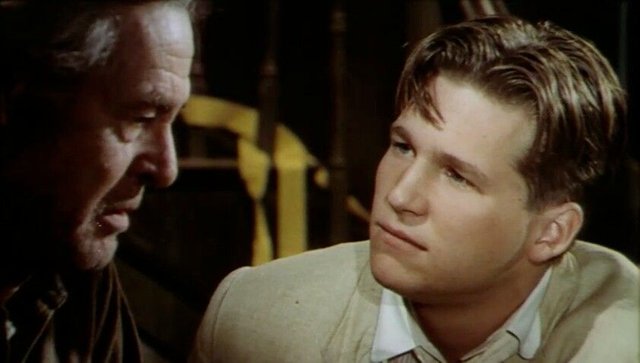
A very young Jeff Bridges as Don Parritt source
‘The Iceman Cometh’ is a fantastic feat of imagery, in my opinion. Through most of the play, the characters are sitting around, or sleeping on the tables, lethargic, never doing anything. This provides great emphasis for the idleness of their situation, the living death of being trapped inside a pipe dream.
Another great image in the play is that of the alcohol. Being a bar, of course, there are (mostly empty) alcohol bottles everywhere. And the similarity between being drunk and dreaming, as I said, is evident in Hickey himself, who claims to be ‘sober’ for once.
Alcohol is known for dulling the senses and helping people fall asleep...and so, to dream. The characters rely on alcohol to give them strength and keep their dream alive and throughout, being sober is considered a dangerous action. If you don’t rely on alcohol, you rely only on yourself and such an idea just can’t work with the pipe-dreamers. You need some external help, because if you were enough, well, why aren’t you living the dream?
While hard to pin down, the main message of the play seems to be there is no way out. You need the pipe dream, in order to keep existing. Hickey leads the characters (and audience) to believe they can escape this prison, that they can kill their tomorrow pipe dreams and free themselves. But as we see later, the actual death of the pipe dream also kills the dreamer, leading one to assume that without pipe dreams, life is meaningless and impossible. A grim conclusion, definitely.
Ironically, at the end of the play, most of the characters (with the notable exceptions of Hickey himself, Parritt and Larry) return to their state of hopefulness. Even though they exist in this slumber, in this living death, they don’t have to face their pipe dreams and are at least able to hope for a better tomorrow.
Famously, Marlon Brando turned down the role of Don Parritt, complaining the text was heavy and dull. Since, there have been various movie adaptations (one in the 70s, with a young Jedd Bridges) and numerous stage productions. The play is still going strong today and I highly encourage you to go see it, if you can.
Have you seen/read 'The Iceman Cometh'?
Authored by @honeydue
Refrences 1 2 3 4 5
Original Thumbnail Pic
Click on the coin to join our Discord Chat

Witness proposal is here:
Go To Steem Witness Page
In the bottom of the page type: adsactly-witness and press vote.

Use small letters and no "@" sign. Or, click here to vote directly!
Thank you!
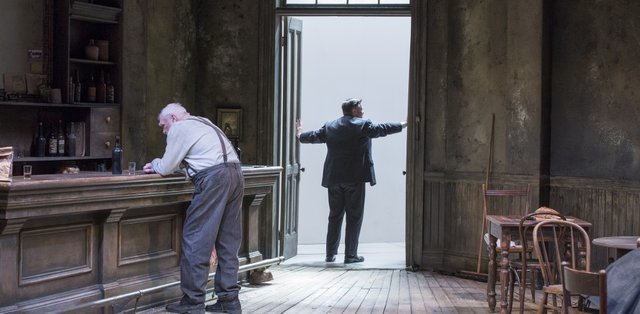
I haven't had the chance to see or read 'The Iceman Comet', unfortunately. But from what you say, there is a kind of allegory of life in this work. Some people do not live but live an eternal dream, where they want and have hope, but do nothing to achieve what they want. Some spaces can often be that bar from which we do not allow ourselves to leave, our comfort zone, where more than living, we vegetate. To live without dreams represents the loss of hope, of the future, a premature death of the human being. Dreams, even if they are impossible, allow the human being to continue in a life that does everything to wake us up and make us put our feet on the ground. As always, delighted with your review, @honeydue.
Unfortunately I have not read the work of O'Neill that you present us, @honeydue (nor seen any film based on it or its theatrical staging). Thanks to your detained comment, I realize that I would like very much to read it. I'll see if I can get it online, the only possible way to access that work.
I think it would not be unfounded to say that there is a marked autobiographical feature in it, not only because of alcoholism, but because of something more ungraspable (the word that comes to me): the awareness of impossibility, which is very present in all a generation of British writers of the first half of the twentieth century, and more llá (I think without a doubt in James Joyce, Virginia Woolf, Somerset Maughan and Samuel Beckett, for example, saving the differences between them).
I think the 'impossible dream' ("pipe dream?") Is an experience inherent in modern man. One lives in a conscious way, but the altered states or the "artificial paradises," as Baudelaire called him, are the most propitious.
I appreciate your good post, @honeydue.
Quite a conundrum.
Thanks for such a wonderful post. Not only does it bring us one of the best playwrights ever, nobel prize laureate O'Neal, but your sucinct and insightful presentation of this play makes one to want to go see it.
One thing I lament about theater is that as if the genre itself were not sufficiently elitist and sort of underground, the way it has not been commercialized makes it really hard for general audiences to ever even know about some wonderful plays (except when they see the movie adaptation, which was the case with Fences, just to mention a recent one), let alone develop a taste for it.
Your images are amazing. We have grown up watching these actors' movies and it would be such a wonderful experience to see young Spacey, Washington and Bridges deliver their version of the leading character. Where does one find recordings of those performances?
I think that it has been detrimental to literary theater that no commercial industry has been developed around it to make it widely known and distributed/available, just like movies are.
From O'neal I remember The Emperor Jones, a play with strong resonances even today.
Thank you, I'm glad you enjoyed the post. :) As far as I know, none of the adaptations are available online in their entirety, but you can see clips on YouTube...And of course, I encourage you to read the play as it's very well written. :D
thanks for your excellent preview @adsactly . keep it up . best of luck
Moved to the Hive platform.